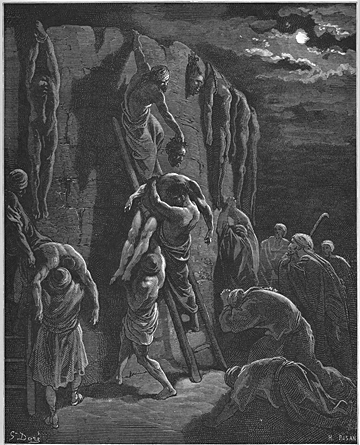1 Chronicles 10
1 The army of Philistia [again] fought against the Israelis. The Israeli soldiers ran away from them, and many Israelis were killed {the soldiers of Philistia killed many Israelis} on Gilboa Mountain.
Nialy am’ Israele o nte-Pelistio; naho nitriban-day amo nte-Pelistio t’Israele vaho nitsingorotritse, zinamañe am-bohi’ i Gilboa eo.
2 The soldiers of Philistia caught up with Saul and his sons, and they killed his sons Jonathan, Abinadab, and Malchishua.
Nitokoe’ o nte-Pelistio t’i Saole naho o ana’eo vaho zinevo’ o nte-Pelistio t’Ionatane naho i Abinadabe vaho i Malkisoà, ana’ i Saole.
3 The fighting was very fierce around Saul, and the (archers/men who shot arrows) shot Saul and wounded him severely.
Nanjomòtse amy Saole i hotakotakey le nitakare’ o mpitàm-paleo am-pale naho nahafere aze o mpitàm-paleo.
4 Saul said to the man who was carrying his weapons, “Take out your sword and kill me with it, in order that these heathen Philistines will not be able to injure me [further] and make fun of me [while I am dying].” But the man who was carrying Saul’s weapons was terrified and refused to do that. So Saul took his own sword and fell on it [and died].
Le hoe t’i Saole amy mpitàm-pikala’ey, Apontsoaño o fibara’oo, le atrebeho amako tsy mone homb’ etoy o tsy nisavareñeo hanao sarerak’ ahy. Fe tsy nimete i mpitàm-pikala’ey amy t’ie nangebahebake. Aa le rinambe’ i Saole i fibara’ey vaho nikorovoha’e.
5 When the man carrying his weapons saw that Saul was dead, he also threw himself on his own sword and died.
Ie nioni’ i mpitàm-pikala’ey te nihomake t’i Saole le niforetrak’ amy fibara’ey ka vaho nivetrake.
6 So Saul and three of his sons all died, and none of his descendants ever became king.
Aa le nihomake t’i Saole naho i ana’e telo rey; sindre nitrao-pikoromake o añ’ anjomba’eo.
7 When the Israelis who were living in the valley saw that their army had run away and that Saul and his three sons were dead, they left their towns and ran away. Then the soldiers from Philistia came and (occupied/lived in) those towns.
Ie nioni’ ze hene nte-Israele am-bavatane ao te nitriban-day naho nihomake t’i Saole naho o ana’eo, le nenga’ iareo o rova’eo, nilay; vaho nimb’eo o nte-Pelistio nimoneñe ama’e ao.
8 The next day, when the Philistines came to take away the weapons of the dead [Israeli soldiers], they found the corpses of Saul and his three sons on Gilboa Mountain.
Ie amy loak’androy naho niheo mb’eo o nte-Pelistio hampikorendake o zinamañeo, le nitendrek’ amy Saole naho amo ana’e nikorovok’ am-bohi’ i Gilboao,
9 They took the clothes off Saul’s corpse and [cut off] his head and took it and Saul’s armor.
naho hinoli’ iereo naho nandrambe i añambone’ey naho o fikala’eo, le nampiariarie’ iareo mb’ an-tane’ o nte-Pelistio mb’eo, ninday i taliliy mb’ amo hazomanga’eo vaho mb’am’ ondatio.
10 Then they sent messengers throughout their land, to proclaim the news throughout their own area, to their idols and to the other people. They put Saul’s armor in the temple where their idols were, and they hung Saul’s head in the temple of [their god] Dagon.
Nanoe’ iereo añ’ anjomba’ o ndrahare’ iareoo o harao’eo vaho napitek’ an-kivoho’ i Dagone ao ty añambone’e.
11 All the people who lived in Jabesh in [the] Gilead [region] heard what the Philistines had done to Saul’s [corpse].
Aa ie jinanji’ Iabese-Gilade ze he’e nanoe’ o nte-Pelistio amy Saole,
12 So the bravest men/soldiers of Jabesh went and got the corpses of Saul and his sons and brought them back to Jabesh. They buried their bones under a large tree in Jabesh. Then the people of Jabesh (fasted/abstained from eating food) for seven days.
le fonga niongake o fanalolahio nandrambe ty fañova’ i Saole naho ty fañova’ o ana’eo le nendese’ iareo mb’e Iabese mb’eo vaho nalenteke ambane’ ty kobai’ Iabese ao o taola’ iareoo vaho nililitse fito andro.
13 Saul died because he did not faithfully obey what Yahweh told him to do. He even went to a woman who talks to the spirits of dead people and asked her what he should do,
Aa le nihomake t’i Saole ty amy fiolà’e am’ Iehovày naho i tsara’ Iehovà tsy nambena’ey naho i namotoaña’e jiny, hañontanea’ey,
14 instead of asking Yahweh what he should do. So Yahweh caused him to die, and he appointed David, the son of Jesse, to be the king [of Israel].
ie tsy nañontane Iehovà; le zinevo’e vaho nafote’e amy Davide ana’ Iisaý i fifelehañey.





















